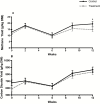Effect of Mootral-a garlic- and citrus-extract-based feed additive-on enteric methane emissions in feedlot cattle
- PMID: 32704901
- PMCID: PMC7200514
- DOI: 10.1093/tas/txz133
Effect of Mootral-a garlic- and citrus-extract-based feed additive-on enteric methane emissions in feedlot cattle
Abstract
Enteric methane (CH4) production is the main source of greenhouse gas emissions from livestock globally with beef cattle contributing 5.95% of total global greenhouse gas emissions. Various mitigation strategies have been developed to reduce enteric emissions with limited success. In vitro studies have shown a reduction in CH4 emissions when using garlic and citrus extracts. However, there is paucity of data regarding in vivo studies investigating the effect of garlic and citrus extracts in cattle. The objective of this study was to quantitatively evaluate the response of Angus × Hereford cross steers consuming the feed additive Mootral, which contains extracts of both garlic and citrus, on CH4 yield (g/kg dry matter intake [DMI]). Twenty steers were randomly assigned to two treatments: control (no additive) and Mootral supplied at 15 g/d in a completely randomized design with a 2-wk covariate and a 12-wk data collection periods. Enteric CH4 emissions were measured using the GreenFeed system during the covariate period and experimental weeks 2, 6, 9, and 12. CH4 yield (g/kg DMI) by steers remained similar in both treatments for weeks 2 to 9. In week 12, there was a significant decrease in CH4 yield (23.2%) in treatment compared to control steers mainly because the steers were consuming all the pellets containing the additive. However, overall CH4 yield (g/kg DMI) during the entire experimental period was not significantly different. Carbon dioxide yield (g/kg DMI) and oxygen consumption (g/kg DMI) did not differ between treatments during the entire experimental period. DMI, average daily gain, and feed efficiency also remained similar in control and supplemented steers. The in vivo results showed that Mootral may have a potential to be used as a feed additive to reduce enteric CH4 production and yield in beef cattle but needs further investigation under various dietary regimen.
Keywords: environmental sustainability; greenhouse gas, methane yield, steers.
© The Author(s) 2019. Published by Oxford University Press on behalf of the American Society of Animal Science.
Figures
References
-
- Alemu A. W., Dijkstra J., Bannink A., France J., and Kebreab E.. . 2011. Rumen stoichiometric models and their contribution and challenges in predicting enteric methane production. Anim. Feed Sci. Tech. 166–167:761–778. doi:10.1016/j.anifeedsci.2011.04.054
-
- Beauchemin K. A., Janzen H., Little S. M., McAllister T. A., and McGinn S. M.. . 2010. Life cycle assessment of greenhouse gas emissions from beef production in western Canada: a case study. Agric. Syst. 103:371–379. doi:10.1016/j.agsy.2010.03.008 - PubMed

